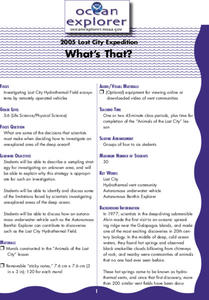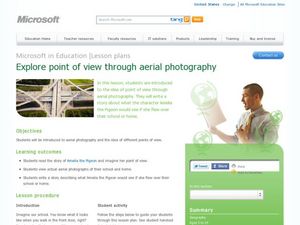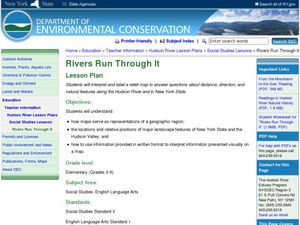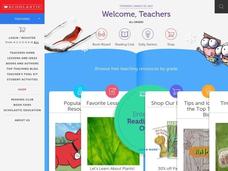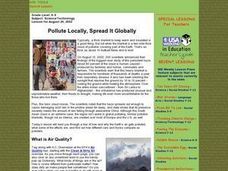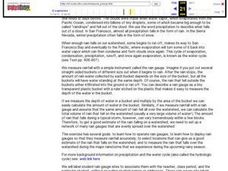Curated OER
Using Imagery To Introduce the Endocrine System
Students listen with closed eyes to a story that starts in a relaxed tone and ends in a scream. They list the body reactions they experience: fast heart rate, shaking, etc. and hypothesize the reason for the reactions. They explore the...
Curated OER
Cloudy With a Chance of Meatballs
The classic book, Cloudy With a Chance of Meatballs lesson, is used to help readers compare and contrast the weather in Chewandswallow to their own town. Students write their own fantasy weather story. This lesson is intended to be an...
Curated OER
Ozone Hole Expert Groups
Research topics associated with the hole in the ozone layer over Antarctica. Researchers write five facts about their topic and one question for each of those facts. They present what they learned to the rest of the class. Six topics are...
Curated OER
Monochromatic Painting
Students experiment and create an original monochromatic painting. They define tint, monochromatic, and shade. They analyze their paintings objectively and determine the connection between color and emotion.
Curated OER
What's That?
Meant to be a simulation of a deep-sea exploration, this requires that another lesson be completed first. In that lesson, titled "Animals of the Lost City," marine biology buffs construct murals of benthic communities. In this lesson,...
Curated OER
Happy Holidays from a Class Full of Angels
Students create a bulletin board of photos of themselves that are superimposed to form the outline of an angel. They use the angels to create special greeting cards for parents and guardians.
Curated OER
Explore Point of View Through Aerial Photography
Read the story Amelia the Pigeon and discuss perspective. Since Amelia is a pigeon with a bird's eye view, use aerial photography to enhance your learners' understanding. Have fun connecting art and literature while talking about...
Curated OER
Harvesting Water from Fog
Students analyze the water issues of Cape Verde in the Peace Corp lesson. In this water resources lesson, students analyze the concept of water being harvested from fog. Students explore the Peace Corps project site by watching Nathan...
Curated OER
Imagine That! Analyzing Imagery
Poems by O. Henry, Marion Dane Bauer, Monty Roberts, and Langston Hughes provide the text for a study of symbolism, hyperbole, and imagery. Employing the “think-pair-share” strategy learners generate definitions of these terms and locate...
Curated OER
River Run Through It
With vocabulary lists, worksheets, and more, this lesson sets learners on an exploration of the Hudson River area. They read an essay about the area, analyze a relief map of New York State, and complete a worksheet.
Curated OER
The Lion, the Witch, and the Wardrobe: Bio Poem
Get to know your learners on a deeper level or invite them to step into someone else's shoes by introducing them to a bio poem. With this type of poetry, scholars will answer questions such as self-description, hopes for the future, and...
Curated OER
Tornadoes
Middle schoolers examine the characteristics of a tornado. They practice using new vocabulary and participate in a question and answer session. They use the internet to gather more specific information.
Curated OER
What's the Weather?
Students explore different types of weather and examine the elements in the sky that create weather. They create a class lift of weather words and examine and discuss a weather poster. Students then complete the "What's the Weather?"...
Curated OER
Pollute Locally, Spread It Globally
Students examine the rate of pollution throughout the world through an interactive program. They define air quality and the air quality index. They examine fuel economy and its impact on the Earth and renewable and nonrenewable resources.
Curated OER
Rainfall Measurement
Students are introduced to rainfall measurement and develop a network of rain gauges. Students measure rainfall, plot rainfall maps and calculate total rainfall volumes during rainstorms.
Curated OER
DEW POINT
Fourth graders investigate conditions causing saturation and measure the dew point of the atmosphere performing simple experiments.
Curated OER
The Water Cycle
Fifth graders investigate evaporation, condensation, and precipitation. They observe a water cycle kit and record their observations, and examine how water condenses on the outside of a cup. Next, they observe an evaporation...
Curated OER
Rain and Rainbows
Students explore the weather system by analyzing water properties. In this precipitation lesson, students review weather related vocabulary terms and discuss how rainbows are created by light hitting droplets at the right time. Students...
Curated OER
The Magic School Bus Dries Up
Students learn along with Ms. Frizzle's class. In this Magic School Bus lesson plan, students work in small groups to find out if foods they eat contain water.
Curated OER
Getting A Charge Out of the Sky
Learners investigate electricity from the sky. In this electricity lesson, students participate in an experiment to simulate the electric charges from the sky. Learners discuss results.
Curated OER
What Goes Around Comes Around
Students investigate how the ocean plays a part in the water cycle. In this earth science lesson, students locate a puddle outside and mark it with chalk. Students observe the changes in the water during the next two days.
Curated OER
A Site to See
Students identify the risks and benefits of living next to a volcano. After reading an article, they discuss the behaviors of an active volcano. Using the Internet, they work together to research volcano-monitoring techniques and create...
Curated OER
The Battle of the Bulge
Students research the events and results of the Battle of the Bulge during World War II. As a class, they discuss the role of the military in the entire European theater and write a paper describing the situations and conditions the...
Curated OER
Indicators For Acids and Bases
Fourth graders compare the color of cabbage water when acids and bases are mixed in. In this acids and bases lesson plan, 4th graders use cabbage water and mix in acids and bases that the teacher prepares before hand. They observe the...






